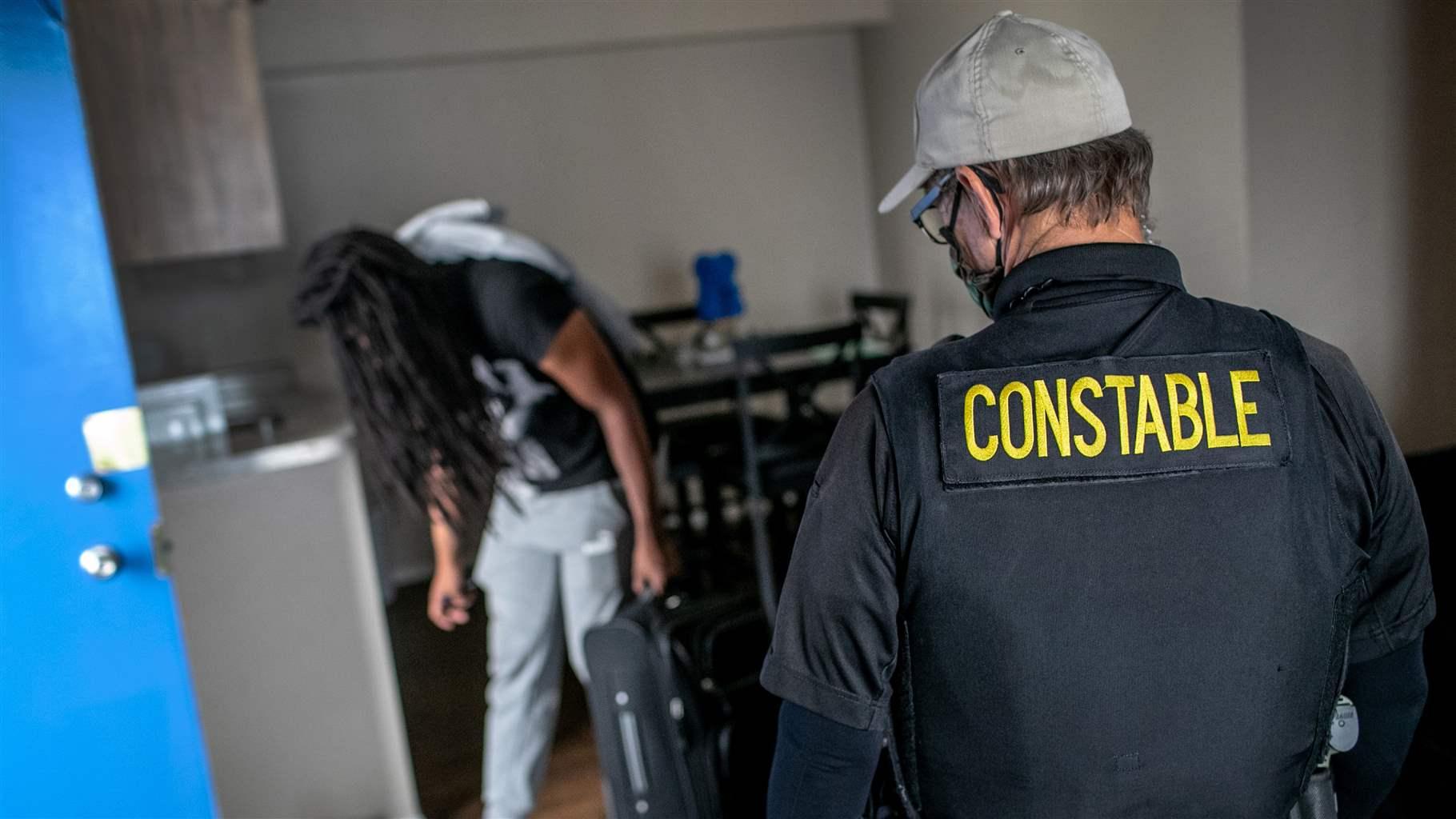How States and Cities Are Preparing for An Eviction Surge Once Moratorium Ends
Officials and experts at webinar discuss creative approaches to limiting displacements

On the same June day that the Centers for Disease Control and Prevention (CDC) announced the final extension through July 31 of its nationwide moratorium on evictions, a panel of state and local officials gathered virtually with researchers to discuss what can be done going forward to limit housing disruptions linked to the pandemic’s economic fallout.
CDC issued the initial federal moratorium on Sept. 4, 2020, with the goal of keeping families housed and stopping the spread of COVID-19. Among the factors contributing to the latest extension was new research from two professors, Emily Benfer and Peter Hepburn, that examines recent eviction data in the context of the spread of COVID-19 and low vaccination rates. Both took part in the June 24 webinar co-hosted by The Pew Charitable Trusts and the Eviction Lab, a national research organization based at Princeton University.
The panelists discussed how emergency housing solutions set in motion during the pandemic can be leveraged to permanently change how courts and state and local governments handle eviction cases. Benfer, a visiting law professor at Wake Forest University, and Hepburn, an assistant professor at Rutgers University, provided an overview of key pandemic trends.
Even before the arrival of COVID-19, courthouse eviction dockets had been characterized by high default judgment rates, burdensome processes, and cascading costs and consequences for landlords, tenants, courts, and taxpayers. These problems will outlast the pandemic; in fact, they are expected to worsen once the moratorium expires and previously delayed eviction cases flood the courts.
Benfer and Hepburn presented their research on housing policy gaps, racial disparities in eviction filing patterns, and the health and socioeconomic consequences of an eviction. They discussed the widespread practices that have been adopted since early 2020 to support financially distressed tenants and landlords, such as emergency orders to temporarily halt eviction lawsuits, wider use of online court hearings, and greater availability of rental assistance.
The panelists who followed represented different branches and levels of government. They included Keith Ellison, Minnesota’s attorney general; Anne-Louise Wirthlin, director of access to justice for the Tennessee courts; Julie Gonzales, a Colorado state senator; and Mark Dodds, a senior manager with the City of Philadelphia. They spoke about how their states, counties, and cities are coming up with creative approaches to manage the impending wave of evictions.
State attorney general steps up
Minnesota’s Ellison described what his office has done to enforce the moratorium, demonstrating how other state attorneys general—often underrecognized actors in housing policy—can similarly engage. He said his team centered its enforcement on targeted education and outreach to both landlords and tenants about the policies in place. His office also has brought claims against noncompliant landlords under the state’s consumer protection codes and has been vigilant to ensure price gouging does not offset the relief brought by rental assistance for tenants, Ellison said.
“Historically the attorney general’s office in Minnesota did not view tenants as consumers,” he explained, “but there is absolutely nothing in our consumer protection statute which exempts tenants, so we’ve been very active in the housing space.”
A focus on what courts can do
The pandemic disruption brought new actors such as attorneys general into housing issues, and also prompted more traditional ones to rethink their roles when it comes to evictions. In particular, state courts are beginning to proactively engage with problems to better manage changing dockets and play a part in resolving landlord-tenant disputes before they become lawsuits.
Wirthlin, representing the Tennessee courts, pointed to eviction diversion and other forms of alternative dispute resolution as promising vehicles for this because of their ability to keep court dockets moving efficiently. She noted how Tennessee’s courts are leveraging their position as the access point for those experiencing housing instability by ensuring that court-connected mediation centers are aware of and able to access rental assistance from the state. The state courts also are leading efforts to convene government and nonprofit stakeholders to make sure that courts aren’t the last to know about other available resources and funding streams.
State lawmakers play a key role
The pandemic also allowed an opportunity to address the challenges surrounding eviction lawsuits in a more long-term, holistic way through policy changes. Colorado enacted sweeping legislative reform of the eviction process this year through a bill that reduces court-ordered late fees and changes court forms to more clearly communicate parties’ rights under the law. The measure, signed into law June 25, addresses the current public health emergency, but also looks toward the future by encouraging meaningful participation of all parties in eviction cases.
Gonzales, the bill’s lead sponsor, said she used polling results and data on rental assistance distribution to drive changes to eviction-related policies.
The rental assistance data, showing both its geographic distribution and how quickly it was depleted, highlighted the severity and widespread need for sustainable solutions. The polling, meanwhile, indicated that most Colorado voters believed policies promoting housing stability were “common sense,” Gonzales said.
City governments can lead the way
State governments tend to play the leading role in developing policy solutions, but the burden of implementation often falls to municipal governments. Philadelphia’s pilot Eviction Diversion Program, launched in September 2020, is being hailed as a national model, representing a multisector collaboration to help tenants remain in their homes, while also helping landlords avoid vacancies and unit turnover costs.
Dodds, senior program manager for the city’s Division of Housing and Community Development, explained that the program was championed by the city council, supported by the courts, and then sustained by his department with help from Community Legal Services. In nonpayment of rent cases, diversion programs can connect tenants with the funding and counseling resources they need to maintain a payment plan, Dodds explained. In Philadelphia, the courts and the city council require parties to participate in the program before an eviction case can be filed, an approach that has resulted in payment agreements to avoid eviction filings for 67% of cases brought over the nine months that the program has been active.
What’s next?
The final CDC extension has drawn the interest of national policymakers and spurred new action around steps to tackle the nation’s eviction problem. For example, the White House recently announced several eviction prevention and housing stability initiatives. At the same time, the U.S. Department of Housing and Urban Development and the Department of Justice have committed to helping municipalities and state courts address the impending surge in evictions and lawsuits.
Although all jurisdictions require approaches tailored to the specific obstacles they face, convening and learning from successes and challenges elsewhere can help frame local discussions to determine actionable, data-driven solutions. At the webinar, the need to bring various stakeholders together across the various spheres of influence proved a common refrain.
Whether it’s the federal government and cities, landlords and tenants, or legal aid and state executive agencies, convening parties with different needs, perspectives, and issues will be critical in the transition from emergency response to long-term impact. Such an approach also can help ensure that changes are implemented effectively.
Full Webinar
Erika Rickard is project director and Natasha Khwaja is an associate with The Pew Charitable Trusts’ civil legal system modernization project.











